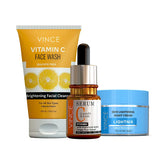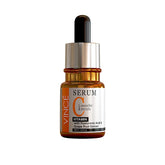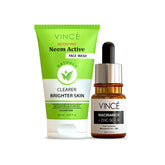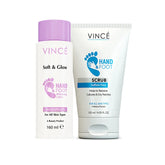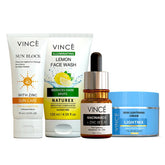How to Exfoliate Dry Skin in Dubai’s Summer

There are several factors that contribute to dry skin in summer. Exposure to hot temperatures and scorching heat can lead to dehydration due to excessive sweating. In this blog, we will discuss all the key factors regarding how to exfoliate dry skin in Dubai’s summer.
What Is Exfoliation?
Exfoliation is a treatment during which we remove dead skin cells from the outer layer of our skin. It offers numerous benefits, including cleaning clogged pores, eliminating dead skin cells, enhancing blood circulation, and promoting softness, radiance, and brightness.
Should You Exfoliate Dry, Flaky Skin?
You should exfoliate dry skin in dubai's summer because increased sweating, sun exposure, and contact with environmental pollutants can lead to the buildup of dead skin cells.
Exfoliation not only makes our skin soft, smooth, and glowing but also helps prevent skin issues resulting from dirt and the presence of dead skin cells.
If you have dry and flaky skin, make sure to exfoliate dry skin. It involves the removal of dead skin cells from the outer layer of the skin, which were once necessary but have now been replaced.
How To Exfoliate Dry Skin On The Face?
The skin on our face is the most sensitive compared to the skin on our body. It requires exfoliation at least twice a week to achieve a clean, glowing, and soft complexion. There are two common methods for exfoliating dry skin:
- Chemical Exfoliants
- Mechanical Exfoliants
1: Chemical Exfoliants
If you have sensitive skin, Chemical exfoliants are a suitable option. Chemical exfoliants are gentle and mild on the skin. But, what exactly are Chemical Exfoliants?
These products contain enzymes or acids and have a gentle texture. There are two main types of chemical exfoliants: alpha-hydroxy acids (AHA) and beta-hydroxy acids (BHA), which are considered active ingredients.
The mild texture of these exfoliators penetrates deep into the skin, effectively removing dirt and dead skin cells. Acids like AHA and BHA also have the ability to combat acne. Chemical exfoliators are the best choice to exfoliate dry skin.
2: Mechanical Exfoliants
Mechanical exfoliators differ from chemical exfoliators. While chemical exfoliators use enzymes and acids, mechanical exfoliation involves manually removing skin cells and other debris from the surface of your skin.
This can be done using tools such as washcloths, loofahs, sponges, and brushes.
Additionally, there are products like scrubs that contain exfoliating particles. By choosing the right exfoliation method for your skin type, you can achieve a smoother and healthier complexion.
How To Exfoliate Dry Skin On Body
We often prioritize facial exfoliation and overlook the importance of exfoliating dry skin on our bodies. Over time, this neglect can lead to dull and dark skin on our bodies. Just as our faces require exfoliation, so does our body.
Exfoliating dry skin on the body can effectively eliminate dead skin cells, enhance skin texture, and enhance the absorption of moisturizers.
Here are some steps and tips to effectively exfoliate dry skin on your body:
1. Choose the Right Exfoliate:
Mechanical Exfoliants: These include scrubbing products with granules or brushes. Look for gentle options with smooth, rounded particles to avoid causing microtears in the skin.
Chemical Exfoliants: These contain acids like alpha hydroxy acids (AHAs) or beta hydroxy acids (BHAs) that dissolve dead skin cells. Glycolic acid, lactic acid, and salicylic acid are common options.
2. Take A Shower With Warm Water:
Start by taking a warm shower or bath to soften your skin and open up your pores. Avoid hot water, as it can strip the skin of natural oils, making dryness worse. On the other hand, warm water helps exfoliate dry skin easily and effectively.
3. Gently Exfoliate Dry Skin:
Apply the selected exfoliant onto your damp skin. For physical exfoliants, gently rub in a circular motion. For mechanical exfoliants, adhere to the product's instructions, as usage can vary based on skin type. Let it sit for the recommended time.
4. Do Not Skip Rough Areas:
Focus on areas prone to dryness and exfoliate dry skin, such as elbows, knees, feet, and the back of your arms. These areas may require a bit more exfoliation.
5. Right Way to Exfoliate Dry Skin:
Many people falsely believe that exfoliating dry skin requires harsh scrubbing. However, aggressive scrubbing can cause redness, irritation, and inflammation, leading to skin discomfort. Avoid scrubbing too hard and let the exfoliant do its job.
6. Rinse Thoroughly:
You can rinse the product with normally cold water but the use of lukewarm water is a better choice for ensuring all product is removed from your skin.
7. Apply Moisturizer:
After exfoliating dry skin, pamper your skin by applying a hydrating moisturizer immediately to lock in moisture. Discover the luxurious experience of products like VINCE's Cocoa Body Butter & Shea Body Butter for exceptionally dry skin.
8. Sun Protection Is Mandatory:
There's no denying that the sun can trigger the overproduction of sebum, but it's also a known fact that it can worsen dryness in individuals with dry skin. If you exfoliate dry skin, your skin becomes more vulnerable to the sun's effects.
So, if you're planning to spend time outdoors, make sure to apply sunscreen to prevent further damage. VINCE'S Sunblock offers options with SPF 40, SPF 50, or SPF 75 that suit the sun's intensity. Dermatologists recommend it because of its superior quality.
How Often Should I Exfoliate Dry Skin?
Exfoliation is a crucial step, whether you have acne-prone, oily, normal, or dry skin type. It's generally recommended to exfoliate dry skin 1-3 times a week, depending on your skin type and the product you're using.
However, it's important to keep in mind that over-exfoliating can lead to skin irritation and worsen dryness. Avoid the mistake of harsh or excessive exfoliation to keep your skin healthy.
Listen To Your Skin
Every product has a different effect on every skin type due to individual dissimilarities. It's essential to pay attention to how your skin responds. If you notice any redness, excessive dryness, or irritation, it indicates that something may not be right for your skin.
So, what should you do in this situation? Consider reducing the frequency of exfoliation or switching to a milder product. Ensure you handle your skincare with care to keep your skin healthy and happy.
How Often Should You Exfoliate Dry Skin?
The regularity of exfoliating dry skin depends on your skin type, the exfoliation method, and how your skin responds.
Generally, it's recommended to exfoliate dry skin 1-3 times a week. Start with once a week and gradually increase if your skin tolerates it well. Over-exfoliation can lead to irritation and worsen dryness, so it's essential to listen to your skin.
Pay attention to any signs of redness, excessive dryness, or sensitivity, and adjust your exfoliation frequency accordingly.
Additionally, consider using milder exfoliants, such as chemical exfoliants with lower concentrations, if you have sensitive or very dry skin.
Consulting a dermatologist can provide personalized guidance on the ideal exfoliation routine for your specific skin needs.
Best Exfoliator For Dry Skin Dermatologist:
Exfoliators play a crucial role in maintaining healthy skin by addressing issues such as dryness, dullness, and flakiness. Vince Apricot Scrub is a versatile exfoliator suitable for all skin types.
For those seeking to get rid of dullness and dark skin, the Whitening Scrub Face Wash is highly recommended, as it effectively exfoliates dry skin and promotes a smoother and brighter complexion.
While focusing on facial care, it's important not to neglect the care of your entire body. The hands and feet are particularly vital areas to pay attention to. The use of a specialized Hand and Foot Scrub can effectively exfoliate dry skin in these areas.
If you have extremely dry skin, the Radiance Peeling Mozaic emerges as an excellent option. Its mild and soft texture is gentle on the skin while remaining highly effective. These exfoliators for dry skin are recommended by dermatologists.
Conclusion
The scorching heat and excess sweat during summer can lead to skin dehydration and dryness. It's important to exfoliate dry skin using gentle exfoliators to ensure safety while removing dead skin cells for a smoother, radiant complexion on both the face and body.
Consistency in exfoliation and proper hydration can gradually enhance skin texture and overall health during the summer months.
Frequently Asked Questions About Exfoliate Dry Skin (FAQs)
Q. What is the best way to exfoliate dry skin?
The best approach to exfoliating dry skin is to use chemical exfoliators. These products are gentle in texture, well-suited for dry skin, and do not typically cause redness, irritation, or inflammation.
Q. Is it OK to exfoliate dry skin?
Yes, you should exfoliate dry skin. However, dry skin can often experience redness or irritation, which is why it's advisable to use chemical exfoliants instead of mechanical exfoliants. Chemical exfoliants are milder in texture and gentler on the skin.
Q. How do you exfoliate dry skin naturally?
Sugar and honey are considered the best exfoliants for dry skin. These two contain powerful exfoliating properties that gently remove dead skin cells and impurities from dry skin without causing any irritation or redness.
Q. Can you exfoliate during summer?
Yes, you can exfoliate during the summer, regardless of whether your skin is dry or oily. Increased sweating, sun exposure, and contact with environmental pollutants can lead to the buildup of dead skin cells. Exfoliation effectively eliminates these dead skin cells and impurities, resulting in a smoother and suppler complexion.

 KSA
KSA
